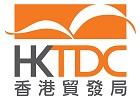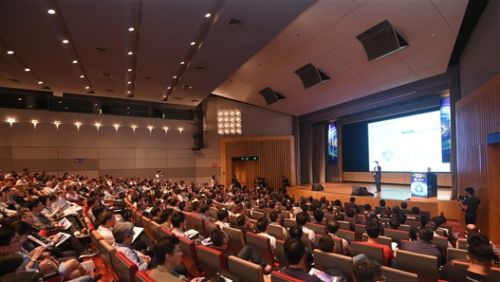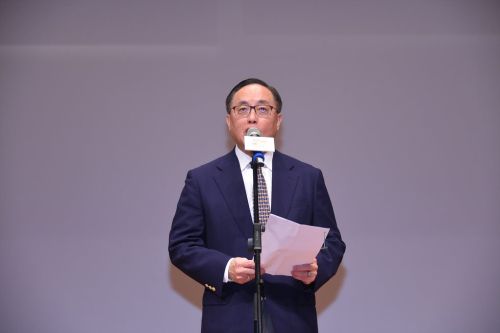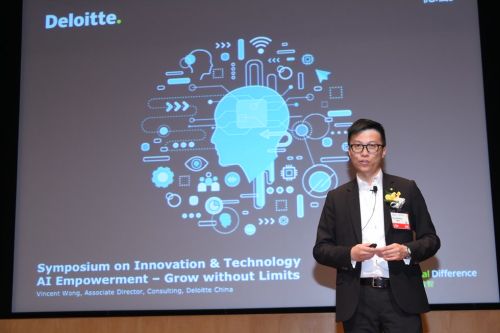|
| Sunday, 14 October 2018, 17:00 HKT/SGT | |
| |  | |
Source: HKTDC | |
|
|
|
|
| Theme: "AI Empowerment - Grow without Limits" |
HONG KONG, Oct 14, 2018 - (ACN Newswire) - Artificial Intelligence (AI) has become more than a buzzword in recent years. It is being used to make enormous advances in productivity and enhance the customer experience in industries as diverse as manufacturing, banking, insurance and retail. The 13 Oct morning session of the Symposium on Innovation and Technology, under the theme "AI Empowerment - Grow without Limits", held during the 38th HKTDC Hong Kong Electronics Fair (Autumn Edition), focused on how AI can empower organisations, how to deal with some of the challenges associated with AI implementation, and how AI will affect the employment picture.
 | | Heavyweight speakers share their insights at the Symposium on Innovation & Technology (13 Oct) under the theme "AI Empowerment - Grow without Limits". The symposium is one of the highlight events of the 38th HKTDC Hong Kong Electronics Fair (Autumn Edition), organised by the HKTDC, and the 22nd electronicAsia, jointly organised by the HKTDC and MMI Asia Pte Ltd. The two fairs opened on 13 Oct and continue through 16 Oct at the Hong Kong Convention and Exhibition Centre. |
 | | Nicolas Yang, Secretary for Innovation and Technology, Hong Kong Special Administrative Region, delivers opening remarks at this year's Symposium on Innovation & Technology. |
 | | Vincent Wong, Associate Director, Consulting, Deloitte China, discusses why enterprises around the world will adopt AI and how senior executives view artificial intelligence (AI) in their companies now and in the future. |
In his opening remarks, Nicolas Yang, Secretary for Innovation and Technology, Hong Kong Special Administrative Region (HKSAR), highlighted some of the HKSAR Government's recent initiatives to promote and develop AI in Hong Kong, noting that the government has made AI one of its key focuses.
AI Is Here - Smarter Together
In his talk, Vincent Wong, Associate Director, Consulting, Deloitte China, discussed why enterprises around the world will adopt AI and how senior executives view AI in their companies now and in the future. Deloitte is one of the world's largest professional services companies, with 263,000 professionals in fields such as accounting, risk advice, compliance, legal services, and management consulting. Deloitte has three fintech labs, one of which is in Hong Kong, where the firm helps companies develop AI strategies, such as natural language processing (NLP) Chatbots and other analytical tools.
"AI is becoming part of our daily lives," said Mr Wong. "And it is going to transform industries." He shared some interesting results of a survey of 250 senior executives to provide a snapshot of what has been happening in the past 12 months. Some 87% of respondents said AI is important or very important for enhancing their product and service offerings, 92% said it was helping their internal processes, and 57% said AI will help their companies run and transform faster than their competitors in the next two to three years.
Mr Wong defined AI as "an umbrella of collective technologies that predict patterns and give insights that humans cannot provide in the same time frame". He divided AI into several categories: computer vision, machine learning, NLP, robotic processing automation (RPA), and speech recognition and optimisation.
Companies are deploying AI in a wide range of industries, he said. In back-office operations, they are using RPA for record keeping and matching work in finance and accounting, and in the legal field to help review contracts and to assist with compliance and fraud issues. In human resources, companies use AI to source the best candidate for a position. AI is used in information systems to predict hardware malfunctions and plan preventive maintenance, and it is used in the supply chain to identify patterns and show how the supply chain can be adjusted for maximum efficiency. AI is used in sales operations and in customer service, from Chatbots handling simple enquiries to those that identify high-risk or high-potential conversations.
Regarding AI's effect on employment, Mr Wong said, "AI will reduce the workload, but it will help business productivity, which will lead to hiring more people."
Mr Wong also focused on how to develop an AI culture within the organisation. "Learn about it. Use it. Learn from experts. Focus on change, not just cost-cutting," he suggested.
In deciding who should lead the AI programmes, he said it depended on the company's priorities: the CFO is often the ideal choice for leadership and vision, although the programmes could be led by the CTO if the focus is on creating new services for clients, by the CIO if improving processes internally is key, or by the COO if what is required is a strong sense of data and relationships, and resource allocation.
Interestingly, only 17% of senior executives in Deloitte's survey said they understood the concepts and application of AI in their company, but 83% said they immediately saw substantial benefits when applying AI projects and said the financial benefits grew with experience.
Mr Wong concluded with three key pieces of advice: (1) jump in now, take a hands-on approach and be an early adopter of AI; (2) focus on change, not just cost-cutting; and (3) learn about AI and work with an expert.
Human-Centred Design in an Artificial Intelligence World
Laine Mann, Global Congress Lead of Pfizer's Global Commercial Operations, discussed the methodology of design thinking, focusing on five pillars: empathising, defining, ideating, prototyping and testing.
Emphasising involves interviewing colleagues or clients with open-ended questions to draw out their stories. "Walk in their shoes. Learn how they feel, what they think and what they are doing," she suggested. "Continue to ask 'why' until you identify their challenges or problems." She used the heart-warming experience of Doug Dietz, the design leader of the MRI machine at GE Healthcare, as an example of the importance of empathy in design. When Doug watched a frail young patient approach his stark, all-white scanner, crying with fear, it triggered a personal crisis that changed his perspective on design forever. His subsequent efforts to see the machine through the eyes of a young child resulted in a pilot programme that changed the MRI suite into a children's adventure story - a pirate ship or adventure ride - with the young patient in a starring role, thus dramatically reducing the number of patients that had to be sedated and increasing patient satisfaction scores.
The defining stage involved "defining the customers' pain points and challenges to determine how problems can be solved in a unique way," said Ms Mann. The key is to frame the problem in the right way, she added. The ideating stage involves brainstorming - developing the broadest range of possibilities, including wild outcomes, to identify solutions.
Regarding the prototype and testing stages, Ms Mann said, "Build to think, test to learn." The prototype doesn't have to be perfect, but "it allows you to see what the future looks like," she pointed out. At the testing stage, the prototype is taken to the customer "to learn, not to validate". Depending on what is learned, the process may go back to the defining or prototype stage, added Ms Mann.
The Future Is Now -- Empowering Industry through AI
"AI is used in virtually every industry," remarked Jesse Lin, Vice President of SenseTime, which is said to be the world's most valued AI start-up. "It (AI) is becoming a general-purpose technology."
She noted that computers were developed about 80 years ago, and neural networks about 30 years ago. In contrast, deep learning was first applied to facial recognition only in 2014. This deep learning depends on three key elements: (1) algorithms, (2) computer power, since you need CPU power to train models, and (3) data, which is the most important element allowing AI.
Founded in 2014 by the head of the Multimedia Lab at The Chinese University of Hong Kong, SenseTime focuses on basic research, specialising in deep learning and computer vision.
Ms Lin reviewed the wide range of verticals her company works with, in which AI+ is now being used extensively: smartphones, mobile internet, smart retail, fintech, smart city and autonomous driving.
In smart retail, companies such as Ikea and Walmart build a customer profile using facial recognition both to enhance the customer experience and to help prevent store losses. The system can recognise gender, age, time spent in each section, sequence of store movement and more to learn more about each customer's interests to provide a better shopping experience. SenseTime is also involved in developing unmanned stores on the Chinese mainland, in which a computer monitor checks which items are removed from shelves, and the customers ask for permission to deduct the purchases from their e-wallet.
In AU+ Fintech, ID verification is made through Sense ID. The customers take a photo with their mobile phone for permission for bank transactions, for example. The system has an error rate of only 1 in 100 million.
AI+ Automobile is used to enable autonomous driving. "We use image recognition to teach the car to see even when the path isn't clear," explained Ms Lin.
She also addressed the jobs concern caused by the rise of AI, pointing out that AI is useful for specific tasks, but that it needs human interaction. "The future is in humans and AI," she said. The challenge is to work together, like a team."
Panel Discussion
In a discussion on helping small and medium-sized enterprises (SMEs) find ways to integrate AI in their operations, panel members mentioned current government initiatives, such as the tech voucher programme, and things the government could do more of, such as helping SMEs retrain and retool. Mr Wong pointed out that SMEs were more agile than large companies and can move new concepts to market much more quickly. He said the key was to help SMEs articulate their problems. "They have ideas, but can't articulate the next step," he said. "They need direction, hints and support." He pointed out that there were a lot of AI training packages available online.
Another topic covered by the panel was how to handle the inevitability of job loss related to AI. Ms Mann suggested this be framed around enhancement. "AI will help enhance a company's products and services, thus generating more business, but there will always be a need for human contact," she said. Garrick Ng, Chief Technology Officer of CISCO Hong Kong, said that employees need to understand that AI is helping enhance products and services, not replacing humans. "People will need help undergoing retraining, but they will be part of the journey," he said. "Humans empower business, and AI helps companies make better decisions more efficiently."
Mei-kei Ieong, Chief Technology Officer, Hong Kong Applied Science and Technology Research Institute Company Limited (ASTRI), said that AI will not replace humans, but certain jobs, such as bank tellers and store check-out clerks, would disappear and that how the transition is managed is the key.
Comparing Hong Kong and the Chinese mainland in the tech field, the panellists agreed that the mainland was ahead in areas such as AI and e-pay, and that Hong Kong companies were more cautious in general than their mainland counterparts, but that this was not necessarily a bad thing. Hong Kong has many advantages, they pointed out, especially in basic research in the universities, advanced technology used in the financial and logistics industries, good financial markets that can support start-ups, and better risk control, consumer protection and law enforcement.
"Hong Kong provides a good balance between technology and consumer protection," said Charles Mok, Hong Kong Legislative Councillor for the information technology (IT) sector. "Hong Kong has the same concerns many other places have, so Hong Kong is a good place to find solutions."
The Symposium on Innovation & Technology continues on Tuesday (16 Oct) under the theme "Technologies & Success Applications in an Age of AI".
Other highlight events of the Hong Kong Electronics Fair (Autumn Edition) 2018 include the Hong Kong Electronic Forum, which will be held tomorrow (15 Oct). Speakers including Michael Pecht, Chair Professor and Director of Centre for Advanced Life Cycle Engineering, University of Maryland in the United States; Norbert Meuser, Managing Director, Viscom Machine Vision Pte Ltd; and Ron Starman, President, Intertek EWA will discuss AI enhanced reliability and functional safety for electronic products.
Fair Website
Hong Kong Electronics Fair (Autumn Edition): http://hkelectronicsfairae.hktdc.com
electronicAsia: www.electronicasia.com
Photo download: https://bit.ly/2NFJHVS
Contact:
Sunny Ng, Tel: +852 2584 4357, Email: sunny.sl.ng@hktdc.org
Joshua Cheng, Tel: +852 2584 4395, Email: joshua.cp.cheng@hktdc.org
Topic: Trade Show or Conference
Source: HKTDC
Sectors: Electronics
https://www.acnnewswire.com
From the Asia Corporate News Network
Copyright © 2024 ACN Newswire. All rights reserved. A division of Asia Corporate News Network.
|
|
|
|

|
|
|
|